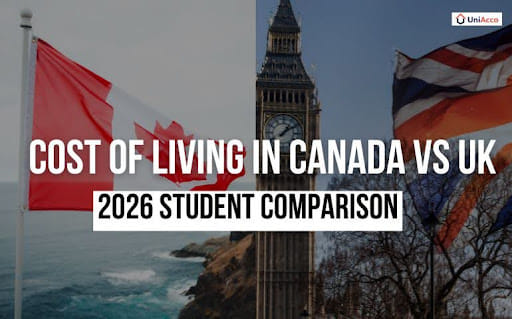When you’ve zeroed in on studying in the UK, you’ve likely encountered UCAS tariff points while exploring your university options. They might seem confusing at first, but they’re actually quite straightforward once you understand the basics.
Consider them as a simple way to convert your qualifications into points. These points help universities assess your eligibility. If you’re unsure how your grades translate, this guide walks you through everything you need to know about UCAS Tariff points.
What are UCAS Tariff Points?
UCAS tariff points are a way to assign value to your post-16 qualifications in the UK. They serve as a common language that universities use to compare different qualifications. Each grade you earn in certain exams, like A-levels or BTECs, converts into a set number of points. The better your grade, the more points you collect.
Not all qualifications carry tariff points, but many popular ones do. Universities use these points to decide if you meet their course entry requirements. This makes it easier for them to assess your application fairly. Understanding how these points work helps you see where you stand when applying. It also shows you how your qualifications measure up against others.
Significance of UCAS Tariff Points for University Admissions
UCAS tariff points help universities compare different qualifications fairly. They turn your exam results into a simple score. This score shows if you meet a course’s entry requirements. Many universities use these points when making offers. They provide a clear way to check if your qualifications fit their standards.
Over 80% of universities include tariff points for at least one course. Nearly 70% of courses ask for a specific total of tariff points. This system also helps colleges and universities report data consistently and accurately. As a student, checking the tariff points for your chosen course is essential. It tells you exactly what you need to apply confidently.
Background and History of UCAS Tariff Points
UCAS tariff points were introduced in 2001 to help admissions compare different qualifications. Over time, more courses and qualifications appeared. This made the original system less effective. So, in 2017, UCAS updated the tariff to include more vocational and international qualifications. The aim was to keep it simple and fair for everyone.
In May 2022, UCAS refined the system further, expanding which qualifications earn points. These changes ensure the tariff stays relevant as education evolves. Today, it remains a key tool for UK university admissions.
Also Read: All You Need To Know About UCAS Application 2025-26
The Role of UCAS Tariff Points in University Entry Requirements
- Help Universities Set Clear Entry Requirements
Many universities use the UCAS tariff score to set entry requirements for courses. Instead of focusing on specific grades, they look at your total points. This makes it easier to understand what you need to qualify. Knowing your points helps you see if you meet a course’s demands.
- Offer Flexibility in Qualification Combinations
UCAS tariff points allow you to combine different qualifications to reach the required total. You don’t have to stick to one set of grades. This means you can mix A-levels, BTECs, or other recognised qualifications. It opens more doors and options when applying.
- Simplify Comparison Across Qualifications
Not all qualifications are the same, but UCAS scores put them on a common scale. Universities can compare your achievements fairly, no matter what exams you took. This ensures equal treatment during admissions. It also gives you a clearer picture of your application strength.
- Influence Your Chances of Receiving Offers
Your total UCAS tariff points can affect whether you get an offer or not. Some courses require a minimum number of points before considering your application. Understanding this helps you focus on meeting or exceeding that target. It keeps your application competitive.
- Guide You in Planning Your Studies
Knowing how many points your qualifications are worth helps you plan better. You can aim for the grades required or select courses that align with your results. This knowledge keeps your university goals realistic and achievable. It also reduces surprises during the application process.
How UCAS Tariff Scores Are Divided by Qualification Levels?
UCAS tariff points cover a range of qualifications at different difficulty levels. These levels help universities compare your achievements fairly. The main types include
1. UCAS Tariff Points A Level
2. UCAS Tariff Points Scottish Highers
3. UCAS Tariff Points Welsh Baccalaureate
4. UCAS Tariff Points International Baccalaureate
5. UCAS Tariff Points BTEC
Each level breaks down further into categories that assign specific points based on your grade. For example, a high A-level grade earns more points than a lower one. This system lets you see how your qualifications stack up. Knowing these UCAS tariff score levels helps you plan which courses to apply for. It also shows where you stand in meeting entry requirements.
Level A & Level AS
Level A and Level AS qualifications are popular choices for students preparing for university. Typically, you select 3 to 4 subjects to specialise in at these levels. Your grades in these subjects convert into UCAS tariff points, which universities use to assess your application.
Here’s how the points break down for Level A:
| Grade | UCAS Points |
| A* | 56 |
| A | 48 |
| B | 40 |
| C | 32 |
| D | 24 |
| E | 16 |
For Level AS qualifications, points are lower but still valuable. Check the points for each grade below:
| Grade | UCAS Points |
| A | 20 |
| B | 16 |
| C | 12 |
| D | 10 |
| E | 6 |
Scottish Highers & Scottish Advanced Highers
Scottish Highers are typically taken in your final years of secondary school. You usually study around five subjects at this level. The Scottish Advanced Highers come after Highers and represent a more advanced qualification. Both are subject-based, with grades converting into UCAS tariff points to support your university application.
Here’s how points are awarded for Scottish Advanced Highers:
| Grade | UCAS Points |
| A | 56 |
| B | 48 |
| C | 40 |
| D | 32 |
Knowing these points helps you understand how your Scottish qualifications match university requirements. It also guides you on what grades to aim for to strengthen your application.
Welsh Baccalaureate
The Welsh Baccalaureate combines both subject-based and vocational learning. It is designed to give you a broad skill set alongside your chosen subjects. Your final grade converts into UCAS tariff points, which universities use to assess your application.
| Grade | UCAS Points |
| A* | 56 |
| A | 48 |
| B | 40 |
| C | 32 |
| D | 24 |
| E | 16 |
International Baccalaureate
The International Baccalaureate (IB) offers a different route from A-levels, covering six subjects across various areas. Your final grade in each subject converts into UCAS tariff points. This helps universities assess your application alongside other qualifications.
| Grades | UCAS Points |
| H7 | 56 |
| H6 | 48 |
| H5 | 32 |
| H4 | 24 |
| H3 | 12 |
| H2 | 0 |
| H1 | 0 |
BTEC
BTEC qualifications focus on practical, vocational learning and are widely recognised in the UK. Your BTEC grades convert into UCAS tariff points, which universities consider during admissions. This helps translate your vocational achievements into a format comparable with academic qualifications.
| Grades | UCAS Points |
| D*D* | 112 |
| D*D | 104 |
| DD | 96 |
| DM | 80 |
| MM | 64 |
| MP | 48 |
| PP | 32 |
Also Read: UCAS Terms Explained: From A to Z
Calculating UCAS Tariff Points
Calculating your UCAS tariff points might sound tricky, but it’s simpler than you think. Here’s what you need to know:
- Some qualifications aren’t included in the tariff. If you don’t see yours listed, don’t panic. Always check your course’s specific entry requirements.
- Each eligible qualification grade converts into a set number of points. Add these together to find your total tariff score.
- While UCAS assigns points, universities can decide how many points they accept. They might adjust points if a qualification isn’t relevant to the course.
- Only Level 3 qualifications (like A-levels, BTECs) count towards your tariff. GCSEs and other lower-level qualifications don’t.
- The best way to be sure is to confirm your qualifications and points with the university or college you’re applying to.
How to Use the UCAS Tariff Score Calculator?
- Search Your Qualification
Start by typing your qualification’s exact title or code. You’ll find this on your certificate or official documents.
- Select Your Subject
If asked, choose the subject you studied. This step helps refine the points calculation.
- Pick Your Grade
From the drop-down menu, select the grade you achieved. The calculator will show the tariff points next to your choice.
- Add More Qualifications
Repeat the process for each qualification you want to include. Each grade adds to your total points.
- Review Your Total Points
Once all your qualifications are entered, click ‘Next’ or ‘Calculate’ to see your full UCAS tariff score.
- Check Course Requirements
Use your total points to compare against the entry requirements of the courses you want to apply for.
Ways You Can Earn UCAS Tariff Points as a Student
You earn UCAS tariff points by completing recognised Level 3 qualifications, like A-levels, BTECs, or the International Baccalaureate. Each qualification and grade earns a set number of points. The total points you need depend on the university and course you apply to, but 112 points is a common minimum. Beyond academic qualifications, some schools offer extra ways to earn points.
For example, volunteering through programmes like ASDAN can add valuable points. You can also earn points by completing English language qualifications such as ESOL. These options provide you with additional opportunities to enhance your tariff score and strengthen your application. Keep an eye on what your chosen university accepts to maximise your points.
Steps to Take When UCAS Tariff Scores Are Not Enough
A lower UCAS tariff score isn’t the end of the road. Many students improve their results or find other routes into university. Keep focused, seek advice, and prepare well for your next steps. Your goal is within reach with the right approach.
- Check Course Requirements Carefully
Some courses don’t rely solely on UCAS points and consider other factors like personal statements or interviews. If your points are low, focus on these areas to improve your chances. Understanding all entry requirements helps you target your application effectively.
- Consider Resitting Specific Subjects
If your UCAS points fall short due to one or two lower grades, resitting those exams can boost your score. Most universities allow up to two resits, so focus on the subjects that need improvement. This targeted effort can raise your overall points without retaking everything. It’s a practical way to strengthen your application.
- Retake Full Qualifications if Needed
If more than two subjects pull your score down, retaking the whole qualification might be worth considering. This can improve your grades and your UCAS points significantly. Some fast-track courses let you complete qualifications in a year, saving time. It’s a bigger commitment but can make a real difference.
- Explore Alternative Qualifications
You might also earn UCAS points through other recognised courses like BTECs or vocational qualifications. These can add flexibility and increase your overall score. Look for options that suit your strengths and interests. They might open new paths to your preferred university.
Understanding Why Universities Rely on UCAS Tariff Scores
Universities use UCAS tariff points to compare different qualifications easily. They convert your grades into a simple number. This number shows your overall achievement clearly. Higher grades mean more points, so better results boost your total. For example, a B at A-level earns 40 points, while a C gets 32. Tariff points also make entry requirements more flexible. Instead of fixed grades, you can meet a points total in different ways. If a course asks for 128 points, you could get there with ABB, AAC, or A*BC. This helps if you do well in some subjects but not others.
Are UCAS Tariff Points Mandatory for All Universities?
Not all universities use UCAS tariff points to decide on your application. Many still focus on your actual grades, like A-levels or equivalent qualifications. So, knowing how your grades convert to UCAS points is useful, but it’s not the whole story.
Some universities, especially big names like Manchester, Leeds, Oxford, and Cambridge, rely on UCAS tariff points for entry requirements. They use points to compare applicants with different types of qualifications fairly. Other universities might ignore tariff points altogether and base their decisions on specific grades or overall performance. This varies by course and institution, so you can’t assume every university treats UCAS points the same way.
Also Read: How to Apply to Universities in the UK through UCAS
Your best bet is to check each university’s exact entry criteria before applying. The UCAS search tool helps you see which courses need tariff points and which don’t. That way, you know exactly what’s expected and can tailor your application accordingly.
In summary, UCAS tariff points matter a lot for some universities but hardly at all for others. Keep this in mind when planning your choices and preparing your application.
FAQs
- What Are UCAS Tariff Points for Indian Students?
For Indian students, UCAS tariff points are calculated mainly through international qualifications like the IB Diploma. These points help UK universities compare your scores fairly with UK qualifications. This system ensures equal chances for international applicants when applying to UK universities.
- What Are the Different Levels of UCAS Tariff Points?
UCAS tariff points come from five main qualification types: A Levels, Scottish Highers, Welsh Baccalaureate, International Baccalaureate, and BTEC qualifications. Each level assigns points based on the grade and size of the qualification. Knowing these levels helps you understand how your qualifications convert to tariff points.
- Which UK Universities Do Not Require UCAS Tariff Points?
Many UK universities do not rely on UCAS tariff points for admission. Nearly two-thirds of institutions, including the University of Greenwich, University of Portsmouth, and University of St Andrews, consider your final grades instead. Always check individual university entry criteria to confirm what they require.
- How Can You Earn Extra UCAS Tariff Points?
You can boost your UCAS tariff score by taking part in recognised extracurricular activities. These include volunteering, music, dance, or leadership programmes. Some accredited schemes, like ASDAN, also award UCAS points. Such activities add valuable points and show your broader skills beyond academics.
- What Is a Good UCAS Tariff Score for University Admission?
UCAS tariff score requirements vary by university and course. As a general guide, top-tier universities typically ask for between 280 and 360 points. Russell Group universities often require 240 to 320 points. It’s important to check the exact requirements for your chosen course and institution.















0 Comments